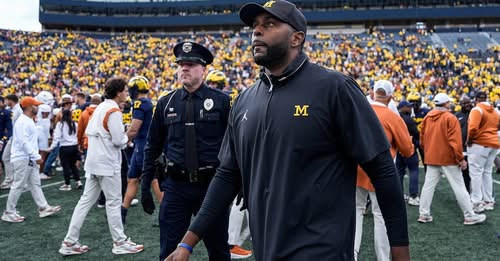The news that the University of Michigan football program will not face a postseason ban or have any of its wins vacated despite the NCAA determining there was “overwhelming evidence” of rule-breaking in its high-profile sign-stealing scandal has sent waves of debate rippling across the college sports landscape. For months, speculation circled about the severity of Michigan’s punishment. Some believed the program might be hit with sanctions comparable to those levied in past decades against teams like USC, Ohio State, or Penn State, where severe infractions led to postseason bans, scholarship reductions, and vacated victories. Others argued that given the modern NCAA’s shifting enforcement priorities and an era where television contracts and playoff structures hold more weight than ever, it was unlikely the organization would jeopardize a brand as significant as Michigan football by stripping wins or barring them from competing in the postseason. The resolution, or lack thereof, now provides fertile ground for analysis regarding fairness, precedent, and the future of NCAA governance.
The scandal itself centered around allegations that Michigan engaged in an elaborate system of sign-stealing that stretched well beyond what is typically tolerated or considered gamesmanship in college football. While decoding an opponent’s signals during the natural course of a game has always existed, NCAA rules are explicit in prohibiting the in-person advance scouting of future opponents or the use of technology to record and catalog play-calling signals. Investigations revealed that Michigan staffers and associates had engaged in precisely those activities, with travel and ticket purchases tied to individuals linked to the program, and scouting footage collected in a way that gave Michigan a competitive edge. For many rivals, this was seen not as minor rule-bending but as a calculated and systemic effort to circumvent the rules, gaining advantages that directly influenced competitive outcomes on the field.
When the NCAA publicly acknowledged it had “overwhelming evidence” that violations occurred, many assumed that Michigan’s fate would mirror that of other programs historically sanctioned. The phrase “overwhelming evidence” seemed to foreshadow a harsh penalty. Yet the organization stopped short of stripping wins, vacating championships, or banning the Wolverines from future postseason play. Instead, the punishment appears to focus more narrowly on individual accountability, recruiting restrictions, or probationary measures rather than institutional penalties that would redefine Michigan’s recent dominance under Jim Harbaugh. For critics, this raises questions about the NCAA’s consistency, its willingness to police the sport with equal vigor across programs, and whether brand prestige now insulates certain schools from the harshest penalties.
The absence of a postseason ban is particularly striking given that Michigan’s success in recent years coincided with the timeframe of the alleged rules violations. The Wolverines reached the College Football Playoff multiple times, finally capturing a long-awaited national championship that elevated the program’s prestige. Detractors argue that if the program benefited directly from an illegal advantage during those seasons, then allowing those accomplishments to stand effectively legitimizes cheating. If wins are not vacated, then the championship banner remains hanging, the playoff berths remain in the history books, and the program continues to reap the financial and recruiting benefits of that era. To those on the outside, it appears as though the punishment does not fit the crime, particularly when considering the immense ripple effect Michigan’s success had on competitors who were denied championships or playoff opportunities during that span.
On the other hand, defenders of Michigan, and of the NCAA’s decision, argue that vacating wins or imposing bans punishes current student-athletes who had no role in orchestrating the scandal. These players, they say, should not see their on-field accomplishments erased because of the actions of staffers or administrators. Furthermore, vacating wins has long been criticized as a largely symbolic measure, one that alters record books but does little to address the underlying issues or deter future misconduct. From this perspective, holding individuals accountable, imposing recruiting restrictions, and enhancing oversight are more practical steps that avoid harming the innocent while still addressing the wrongdoing. This argument is strengthened by the NCAA’s current climate, in which player empowerment and athlete rights are at the forefront, and the organization is keen to avoid backlash from penalizing those not directly responsible.
Yet history looms large in the conversation. Ohio State’s “Tattoo-Gate” scandal more than a decade ago led to vacated wins and a postseason ban, despite the violations centering on players trading memorabilia for tattoos and other benefits, which many today consider trivial compared to organized sign-stealing. USC faced devastating sanctions, including vacated championships and scholarship reductions, stemming from Reggie Bush’s improper benefits case. Penn State saw wins vacated in the wake of its far more serious scandal, though some of those penalties were later reduced. Compared to those precedents, Michigan’s outcome looks lenient. That perception fuels the belief among rival fanbases and some analysts that the NCAA is no longer enforcing rules uniformly, instead weighing financial and reputational factors before doling out punishment. Michigan, with its vast alumni base, historic prestige, and its role in driving television ratings, may have simply been “too big to punish.”
This outcome also reflects the changing priorities of college athletics governance. The NCAA has, in many respects, retreated from its once-aggressive enforcement posture. With the rise of name, image, and likeness (NIL) opportunities, the transfer portal, and ongoing legal challenges to its authority, the organization has been forced to reconsider how it governs. In this environment, hammering Michigan with sweeping penalties might have sparked lawsuits, emboldened critics, and even accelerated the movement toward conferences or the College Football Playoff Committee assuming greater authority over enforcement. The NCAA’s reluctance to strip wins or issue a postseason ban could be seen less as favoritism and more as an acknowledgment of its diminished power and the shifting landscape of college sports governance.
Still, the optics are challenging. Coaches across the nation will now have to explain to their players why the rules exist and why they must be followed, even though one of the sport’s biggest programs appears to have escaped the harshest consequences. Athletic departments may quietly take note that systemic rule-breaking, if executed carefully, may not result in the kind of program-damaging penalties that once deterred such behavior. This creates a dangerous precedent where enforcement becomes less about the rulebook and more about politics, perception, and institutional clout. For an organization already struggling with legitimacy, the Michigan decision risks further eroding confidence among fans, athletes, and schools.
For Michigan itself, the resolution allows the program to move forward with minimal long-term damage. Its recent national title stands intact, its recruiting machine remains powerful, and its place in college football’s elite tier is secure. Jim Harbaugh, whose tenure had been clouded by the scandal, can now claim vindication of sorts, insisting that while mistakes were made, the program was not stripped of its accomplishments. Recruits and their families will likely view the scandal as a footnote rather than a defining stain, especially with the NCAA’s decision confirming that Michigan remains a program where winning is celebrated and sustained.
The broader Big Ten landscape also shifts with this resolution. Rival programs like Ohio State, Penn State, and Michigan State, which may have hoped the scandal would weaken Michigan and restore balance to the conference, now face the reality that the Wolverines’ dominance is unlikely to diminish. The tension between Michigan’s ascendance and Ohio State’s frustration, in particular, will only intensify, as Buckeye fans lament that victories may have been tainted yet remain in the record books. For television networks and conference executives, however, this outcome preserves the marquee matchups that drive ratings and revenue, ensuring that Michigan remains a powerhouse brand in the sport’s most lucrative conference.
Perhaps the most important takeaway from this saga is the message it sends about the NCAA’s role in modern college football. By finding “overwhelming evidence” of violations yet choosing not to impose the harshest traditional penalties, the NCAA has essentially admitted that the rulebook alone no longer dictates outcomes. Instead, context, optics, and institutional standing matter just as much. This reality reflects not only the weakening authority of the NCAA but also the evolution of college football into an enterprise driven primarily by money, ratings, and brand value. In that environment, enforcing the rules uniformly becomes increasingly difficult, and selective leniency risks undermining the integrity of competition.
For college football fans, the Michigan case is a reminder of the complex, often contradictory forces at play in the sport they love. On one hand, it affirms the greatness of recent Michigan teams, preserving their victories and championships. On the other, it fuels cynicism about fairness and consistency, particularly for fans of programs that endured harsher sanctions in the past. It raises difficult questions about what constitutes a meaningful punishment in modern college athletics, and whether the traditional tools of vacating wins or imposing bans still carry any real weight in an era where the scoreboard, television contracts, and recruiting headlines matter far more than record books.
Ultimately, Michigan walks away from this scandal largely unscathed in terms of tangible achievements. The Wolverines’ banners remain, their championships intact, and their postseason eligibility unharmed. The scandal may linger as a talking point for rivals, a footnote in history, or a blemish on an otherwise sterling era, but the lack of sweeping sanctions ensures it will not derail the program’s trajectory. For the NCAA, however, the decision deepens the perception that it enforces rules unevenly, bending to the pressures of brand power and revenue protection. In the long run, that perception may be far more damaging to the sport than any single scandal or violation.



